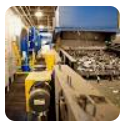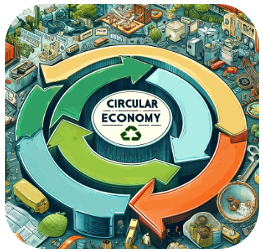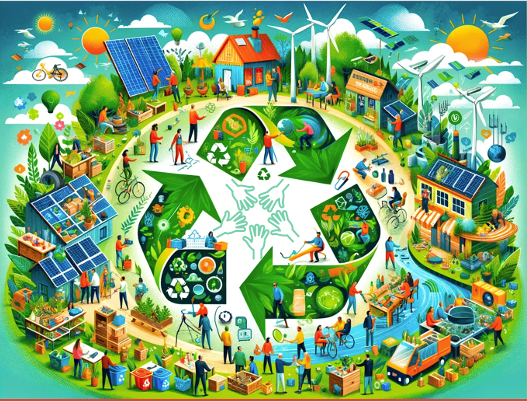Welcome back! If you missed Part 1, we covered the fundamentals of the Environmentally Sustainable Procurement Policy (ESPP) and why it matters for Australian businesses and the environment. We also explored what the policy entails and how it encourages sustainable practices across high-impact procurement categories.
Here’s a recap to get you up to speed:
The ESPP, effective from July 1, 2024, aims to integrate circular economy principles into government procurement, promoting environmental responsibility and innovation. The policy initially targets construction services projects over $7.5 million, extending to furniture, fittings, ICT goods, and textiles from July 1, 2025. This shift towards sustainability is expected to significantly reduce greenhouse gas emissions and encourage the development of environmentally friendly products and services. Businesses must comply with new sustainability standards, which presents both challenges and opportunities for growth and leadership in the market.
Now, let’s dive into the perspectives of various experts on this policy shift, providing a comprehensive view of its implications and how different sectors can adapt and thrive.
Lawyers’ Point of View
Author: Russell Kennedy

The Australian Government has released the Environmentally Sustainable Procurement Policy (ESP Policy) to leverage Commonwealth procurement to promote circular economy principles and deliver on Target 4 of the National Waste Policy Action Plan. The ESP Policy is set to impact procurement practices in targeted industry sectors.
Insurance Point of View
Author: Insurance Business Mag

The Centre for Policy Development (CPD) advocates for unified state and federal procurement policies to accelerate Australia’s net-zero transition. The report emphasises the significant role of government procurement in driving demand for low-emission goods and services, highlighting the need to align procurement practices to reduce emissions and support green industries.
Manufacturing’s Point of View
Author: AU Manufacturing

Environment Minister Tanya Plibersek announced the Environmentally Sustainable Procurement Policy, starting July 2024, requiring companies bidding for government construction contracts to meet sustainability outcomes, including using recycled materials. By July 2025, this policy will extend to textiles, ICT goods, and furniture, promoting recycling and waste reduction.
Architects’ Point of View
Author: Architecture and Design

The Infrastructure Sustainability Council (ISC) has praised the Federal Government’s Environmentally Sustainable Procurement (ESP) Policy. Set to begin in July 2024, this policy focuses on climate, environment, and circularity. Suppliers must report on sustainability metrics, including obtaining an IS Rating. The ISC believes this policy will boost sustainable practices and innovation, significantly impacting procurement across industries.
Engineers’ Point of View
Author: Create Digital

Engineers Australia applauds the Environmentally Sustainable Procurement Policy, emphasising its role in driving innovation and economic prosperity through circular economy principles. This policy aims to reduce greenhouse gas emissions and promote environmentally friendly practices, shaping markets and creating jobs in new technologies and sustainable materials.
Waste Management’s Point of View
Author: Waste Management Review

The Federal Government’s new Environmentally Sustainable Procurement Policy will generate local demand for recycled goods, cut waste, and drive Australia’s circular economy transition. From July 2024, government construction projects over $7.5 million must meet sustainability outcomes, with the policy expanding to other sectors in 2025. This initiative aims to boost jobs and protect the environment by promoting remanufacturing and recycling.
Procurement’s Point of View
Author: Comprara

The ESPP empowers businesses to innovate and offer sustainable products, signalling the Government’s commitment to a circular economy. For procurement professionals, this means prioritising green suppliers, buying recycled materials like steel, timber, and concrete, and preparing for detailed sustainability reporting.
By adopting sustainable practices, you can gain a competitive edge in bidding for government contracts and align with the industry’s growing focus on environmental responsibility., For seven tips to help you navigate these changes …
Need Your Procurement Practices Assessed?
As sustainability becomes key in procurement, our tool reviews your capabilities, focusing on sustainability and ethical sourcing.
Why It Matters:
With the ESP Policy transforming procurement, our assessment aligns your practices with these new standards. We analyse your current state and guide you to higher maturity levels on Sustainability and Ethical Sourcing. We will rate your practices from basic to best in class, so you know where you stand and what to remedy.
How It Works:
Our diagnostic benchmarks your procurement maturity, identifying growth areas and setting attainable goals. This strategic insight aids in decision-making for procurement strategies and skill development.

Elevating Your Procurement Practices
At Comprara, we understand the intricacies of building and construction, and we are here to support you through the transition to meet the requirements of the Environmentally Sustainable Procurement Policy (ESPP). We empathise with the challenges you may face, but we also see immense opportunities for your business to thrive.
Meeting the ESPP requirements can position your business as a leader in sustainable construction, giving you a competitive edge in bidding for government contracts. The market demand for sustainable and environmentally friendly construction is growing. By aligning with the ESPP, your business can attract clients who prioritise sustainability and demonstrate a commitment to responsible practices.
Ensuring compliance with the ESPP keeps you eligible for government contracts and prepares your business for future regulations that might extend to other sectors. This proactive approach can set you apart from competitors and establish your business as a forward-thinking leader in the industry.
We recognise that transitioning to more sustainable practices may involve upfront investments in new materials, technologies, and training. Re-evaluating and adjusting your supply chain to source sustainable materials and services can seem daunting. Additionally, implementing the documentation and reporting systems to comply with the ESPP can be resource intensive.
However, you don’t have to navigate these changes alone. Comprara is here to help. Our expertise in procurement and supply can guide you through these adjustments efficiently and effectively. We can assist in procurement plans, price benchmarking, opportunity analysis, and go-to-market strategies and develop robust documentation and reporting systems that meet ESPP standards.
Together, we can turn these challenges into opportunities, ensuring your business complies with the ESPP and thrives in a more sustainable and environmentally conscious marketplace.
Conclusion
The Environmentally Sustainable Procurement Policy represents a bold step towards embedding sustainability in government procurement processes. By requiring businesses to meet strict environmental standards, the policy not only aims to reduce waste and greenhouse gas emissions but also stimulates innovation and economic growth in the green sector. As various industry perspectives suggest, this policy could significantly shape Australia’s journey towards a sustainable and circular economy.
Environmental Sustainable Procurement Resources
Environmentally Sustainable Procurement Policy and Reporting Framework: https://www.dcceew.gov.au/environment/protection/waste/sustainable-procurement/environmentally-sustainable-procurement-policy
Toolkit & Resources: https://www.dcceew.gov.au/environment/protection/waste/sustainable-procurement/toolkit
Sustainable Procurement Guide:
https://www.dcceew.gov.au/sites/default/files/documents/sustainable-procurement-guide_0.pdf
Sustainable Procurement Masterclasses:
https://www.dcceew.gov.au/environment/protection/waste/sustainable-procurement/masterclasses



